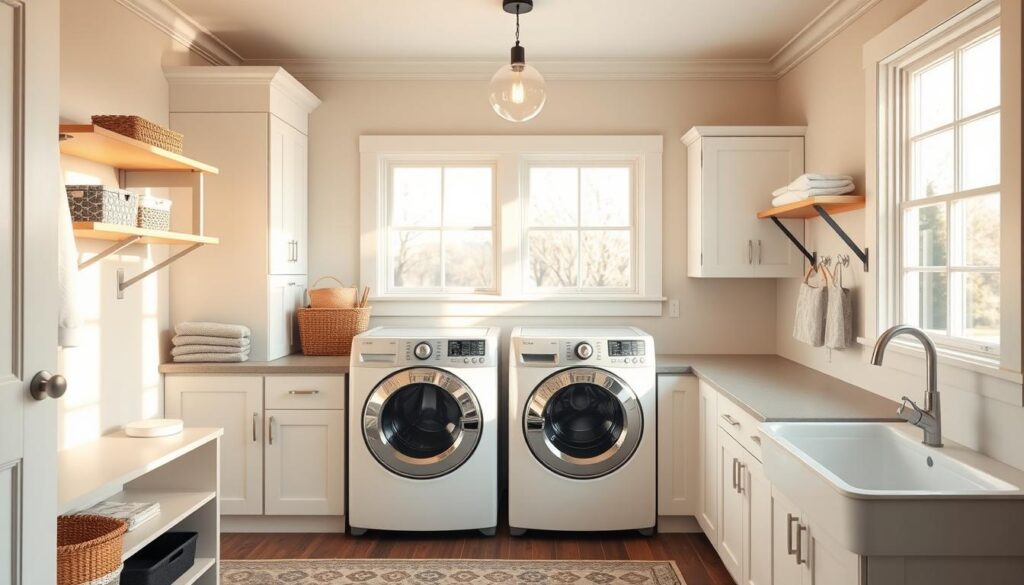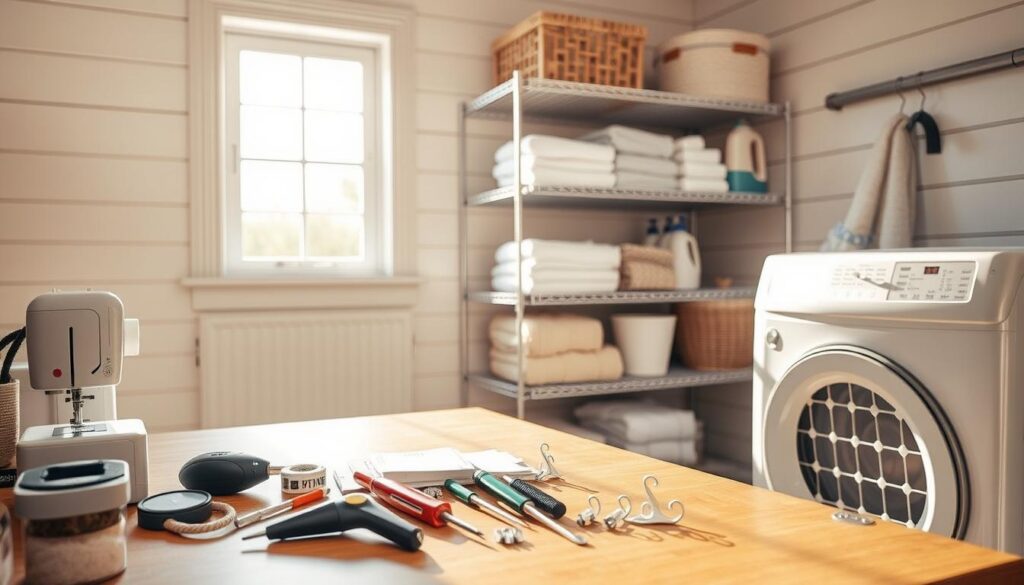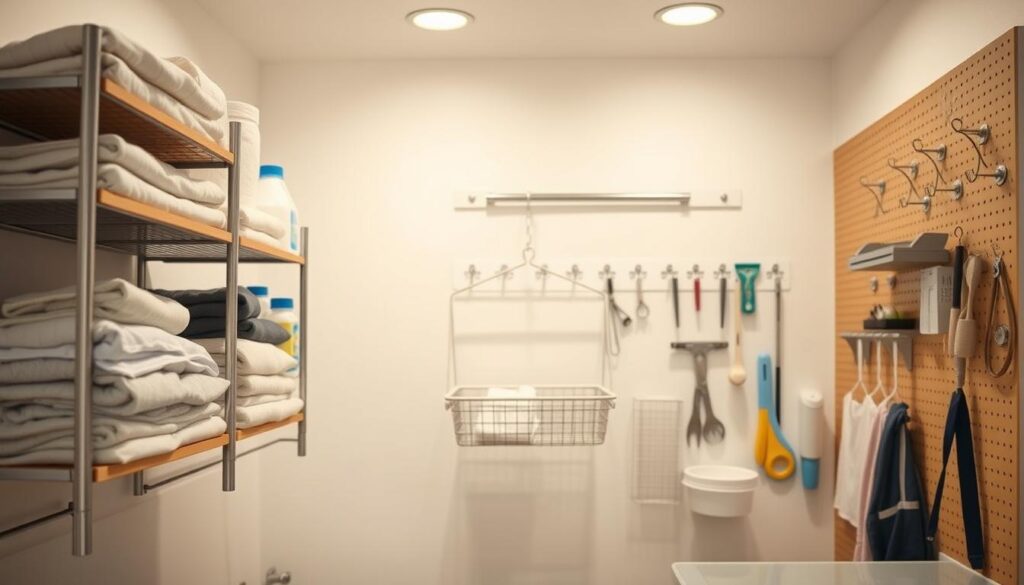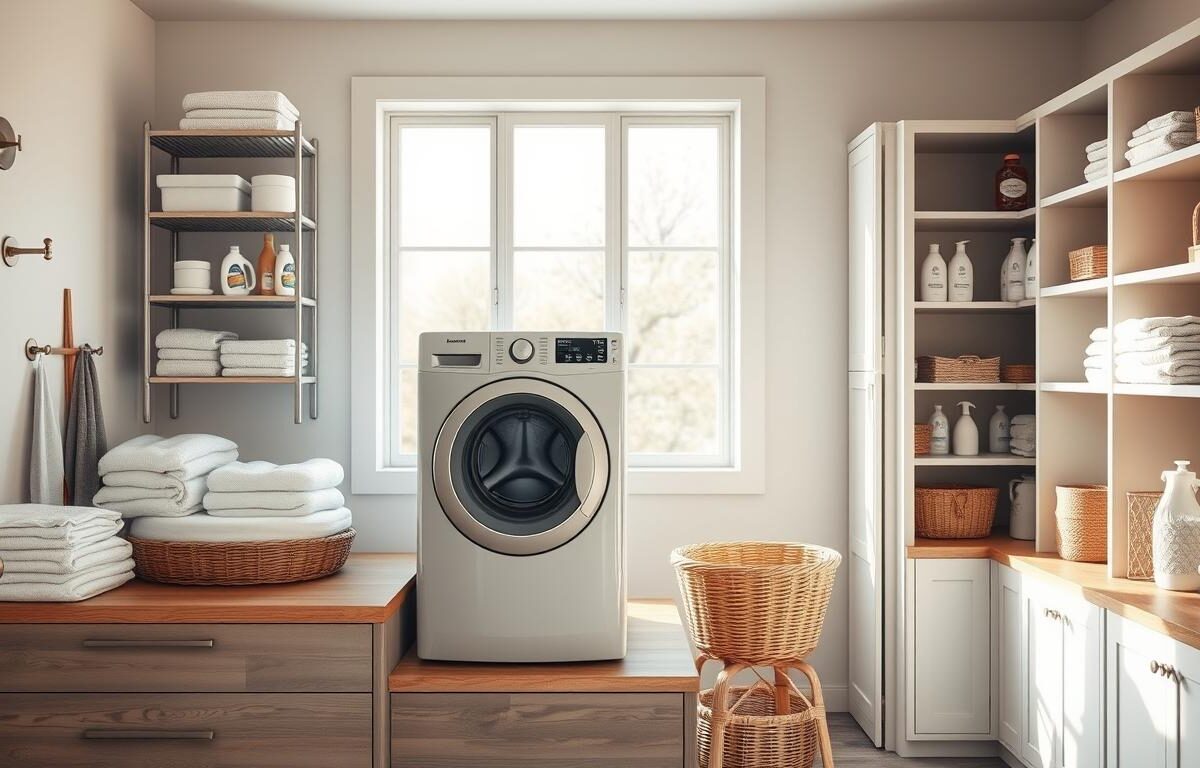Does your laundry area feel more like a chaotic storage zone than a functional space? You’re not alone. Many homeowners struggle to keep this essential part of their home tidy, but a few clever tweaks can turn it into a streamlined hub for washing clothes. With some creativity and basic tools, you can design systems that make laundry day faster and less stressful.
Smart storage solutions don’t require a big budget or renovation. Think vertical shelves for detergent bottles, labeled bins for sorting clothes, or repurposed jars for small items like clothespins. These projects maximize every inch of available space while keeping supplies within easy reach.
An organized laundry zone does more than just look neat—it saves time and reduces frustration. When everything has a designated spot, you’ll spend less time hunting for missing socks or stain removers. Plus, a clutter-free environment makes routine tasks feel more manageable.
Key Takeaways
- Transform cluttered areas into efficient workspaces using vertical storage and labels
- Repurpose everyday items like jars or bins for budget-friendly organization
- Create designated zones for sorting, washing, and folding to streamline tasks
- Improve functionality with easy-access supplies and clear counter spaces
- Reduce daily stress by maintaining a tidy and intuitive layout
Introduction
Transforming your laundry area into an efficient space doesn’t require magic—just smart strategies. While this part of the home often becomes a catch-all for mismatched items, intentional organization creates a functional zone that works harder for you. Imagine opening the door to a tidy, purposeful setup where supplies stay visible and tasks flow smoothly.
Overview of Clutter-Free Benefits
A streamlined layout cuts through daily chaos. No more digging through piles to find stain remover or wasting time untangling dryer sheets from cleaning rags. Clear surfaces and labeled containers turn washing routines into quick, predictable steps rather than scavenger hunts.
Studies show orderly environments reduce stress by up to 30%. In a well-planned area, folding stations stay accessible, and sorting bins keep clothes moving from hamper to machine. This efficiency adds minutes back to your week—minutes better spent relaxing or tackling other projects.
Why DIY Projects Make a Difference
Custom solutions adapt to your unique needs. Unlike pre-made shelves that might not fit snugly between appliances, handmade racks or pull-out trays use every inch. Building your own systems also lets you choose materials that match your style, whether farmhouse rustic or sleek modern.
Budget-friendly upgrades prove you don’t need contractors for big impact. A $20 wall-mounted drying rack or repurposed kitchen cart can revolutionize workflows. Best of all, you control the timeline—start small with a single shelf and expand as inspiration strikes.
Setting the Foundation for an Organized Laundry Room
Every efficient system begins with understanding its core components. Start by examining your current setup like a detective solving a puzzle. Urban homes often face unique challenges—nearly 43% of city dwellers manage with laundry spaces smaller than 4×4 feet, according to recent housing surveys.

Assessing Your Space and Layout
Grab a tape measure and notebook. Document wall dimensions, outlet locations, and gaps between appliances. Narrow corridors might benefit from sliding shelves, while angled ceilings could house tilt-out storage bins. Pay special attention to zones near water sources—these areas work best for stain treatment stations.
| Layout Type | Common Challenges | Smart Solutions |
|---|---|---|
| Closet-Sized | Limited floor space | Over-door racks, stackable units |
| Galley Style | Poor traffic flow | Pull-out counters, wall-mounted drying rods |
| Multi-Use Area | Mixed function chaos | Room dividers, labeled zones |
Establishing Functional Zones
Divide your territory into purpose-driven sections. Designate a folding station near natural light for better stain visibility. Keep detergents and dryer sheets within arm’s reach of machines. For air-dry items, install retractable lines above washers—they vanish when not needed.
Notice where clutter accumulates? Corners often become lint graveyards. Combat this with vacuum-mounted broom holders or triangular corner shelves. Remember: movement matters. Leave 36 inches between key stations for comfortable workflow—no more hip-checking the dryer while carrying full baskets!
DIY Laundry Room Essentials
A well-stocked toolkit is the secret weapon for any organization project in your laundry room. Whether you’re mounting shelves or building custom racks, having reliable equipment ensures your vision becomes reality without hiccups.
Must-Have Tools and Supplies
Start with a drill, level, and stud finder—these prevent crooked shelves or wobbly brackets. Measuring tapes and pencils are non-negotiables for spacing hooks evenly. Wall anchors? They’re heroes for securing heavy items to drywall.

Airtight bins shield detergent pods from humidity, while paint stir sticks double as free lint scrapers. Sandpaper and primer transform old cabinets into sleek storage. For quick fixes, keep adjustable tension rods nearby—they hold ironing boards or drying racks in seconds.
Smart Solutions for Lasting Results
Pegboards with movable hooks keep supplies visible but off counters. Pro tip: Label bins clearly to avoid mid-cycle scavenger hunts. Always measure twice before drilling—this ensures your dream setup looks polished.
With these essentials, you’ll streamline tasks and maintain a clutter-free space that works as hard as you do.
Space-Saving Storage Ideas
Maximizing every inch of your utility area requires clever hacks that blend form and function. Strategic solutions turn cramped walls and awkward corners into high-capacity storage zones without eating into your workflow. Let’s explore how to create systems that adapt as your needs evolve.

Pegboards, Shelves, and Cabinets
Vertical surfaces offer untapped potential. A full-height pegboard wall holds ironing boards, brooms, and adjustable baskets for quick access. Pair it with floating shelves above appliances to keep detergents visible but out of the way.
| Solution | Best For | Capacity Boost |
|---|---|---|
| Pegboards | Tools & accessories | +15-20 items |
| Floating Shelves | Daily supplies | 6-8 bottles |
| Behind-Door Units | Small essentials | 12+ compact items |
Shallow cabinets beside machines stash stain sticks and dryer sheets. Use clear bins to spot refills at a glance. For tight spots, 6-inch-deep shelves fit snugly without blocking walkways.
Repurposing Furniture for Extra Storage
That old dresser collecting dust? Give it new life as a sorting station. Deep drawers hide linens, while the top becomes a folding surface. Bookcases with doors conceal cleaning supplies yet let you grab rags mid-cycle.
Ceiling-mounted racks solve seasonal storage woes. Suspend bulkier items like comforters in breathable bags above eye level. A rolling cart tucked between appliances holds stain treatments—wheel it out when spills strike.
Creative Laundry Room Projects
Transform tight spaces into efficient hubs using clever, customizable solutions. These upgrades tackle common pain points—like lost socks or overflowing supplies—while adding personality to your utility zone. Best part? Most require basic tools and weekend effort.
Slide-Out Hampers & Rolling Carts
Repurpose cabinet drawer slides to create hidden sorting stations. Attach canvas bags instead of trash bins for a space-saving clothes collector that glides shut when not in use. For gaps between your washer dryer, build a slim cart on casters. It stores detergent pods and stain sticks while preventing lint buildup.
| Project | Materials Needed | Time Investment |
|---|---|---|
| Slide-Out Hamper | Drawer slides, fabric bin | 1.5 hours |
| Narrow Cart | Plywood, wheels | 2 hours |
Custom Pedestals & Multi-Purpose Hooks
Elevate front-load machines with sturdy platforms made from sealed plywood. The 12-inch lift makes loading easier and creates hidden storage drawers for ironing supplies. Mount heavy-duty hooks along walls or cabinets—they’ll hold everything from delicates to cleaning tools without cluttering surfaces.
One homeowner shared: “Building a pull-out hamper system cut our floor clutter by 70% overnight.” Whether you’re organizing laundry baskets or creating vertical drying racks, these projects adapt to your unique needs.
Maximizing Small Laundry Room Layouts
Compact laundry areas challenge even the most organized homeowners. Clever layouts turn cramped quarters into high-functioning spaces by focusing on vertical storage and hidden solutions. Let’s explore how to stretch every inch without sacrificing style.
Utilizing Vertical Space Effectively
Floor-to-ceiling shelving units transform blank walls into storage powerhouses. Narrow cabinets between appliances hold detergent pods or stain sticks. For air-dry items, wall-mounted drying racks fold flat when unused.
| Storage Type | Best Use | Space Saved |
|---|---|---|
| Floor-to-ceiling shelves | Bulk supplies | 4+ sq ft |
| Wall-mounted drying rods | Delicate fabrics | 3 sq ft |
| Ceiling-mounted baskets | Seasonal items | Overhead zones |
Behind-the-Door Shelves and Compact Solutions
Over-the-door organizers stash lint rollers and dryer sheets in shallow pockets. Custom 4-inch-deep shelves beside door frames hold spray bottles without blocking hinges. One homeowner noted: “These hidden spots store 80% of our daily essentials.”
Retractable elements shine in tight spots. A fold-down table becomes a folding station, then tucks away. Magnetic strips on appliance sides keep scissors and clips accessible. Corners get purpose with triangular racks for hangers or cleaning tools.
Personalizing with Laundry Room Décor Ideas
Your utility space deserves as much personality as the rest of your home. Thoughtful design choices transform functional areas into inviting spots you’ll actually enjoy using. Whether you lean toward nostalgic charm or crisp modernity, these decor ideas blend style with practicality.
Vintage and Industrial Style Inspirations
Channel early 20th-century charm with repurposed items. Antique washboards make striking wall art, while galvanized metal buckets hold supplies. Exposed pipe shelves and vintage signage add character without cluttering workflows.
| Style | Key Elements | Color Palette |
|---|---|---|
| Vintage | Framed ads, cafe curtains | Red + Aqua |
| Industrial | Metal carts, wire baskets | Slate + Copper |
Modern Accents and Color Schemes
Brighten compact areas with sunshine yellow walls or mint green cabinets. Pair clean-lined shaker doors with matte black handles for contrast. Under-cabinet LED strips illuminate folding stations while adding sleek flair.
Textiles soften hard surfaces. Try washable rugs with geometric patterns or linen curtains. For cohesion, match fabric bins to your wall paint. One homeowner shared: “Painting our shelves the same white as the trim made everything feel intentional.”
Optimizing Laundry Machine and Ironing Board Placement
Arranging your machines strategically can transform your workflow from frustrating to frictionless. A well-planned layout keeps essentials within reach while maintaining clear pathways for sorting and folding.
Efficient Washer and Dryer Configurations
Front-load machines shine when elevated on sturdy pedestals—this simple lift reduces bending and creates hidden storage drawers. Side-by-side placements work best in spacious areas, allowing easy access to both appliances. In tighter spots, vertical stacking saves floor space without sacrificing functionality.
Don’t ignore narrow gaps between units. Slim rolling carts slide into these zones, holding detergent pods and stain sticks. Always leave 4 inches behind machines for proper ventilation and lint trap access.
Smart Mounting and Storage for Ironing Boards
Wall-mounted fold-away units solve the “where did I put that?” dilemma. Install them near outlets for quick touch-ups, using heavy-duty hooks from hardware stores. Pair with floating shelves to store irons and spray bottles at eye level.
For frequent use, create a dedicated pressing zone. Mount the board beside a countertop for folding finished items. Ceiling pulleys or retractable cords keep irons safely stowed yet accessible. One user reported: “This setup cut my ironing time by half!”

